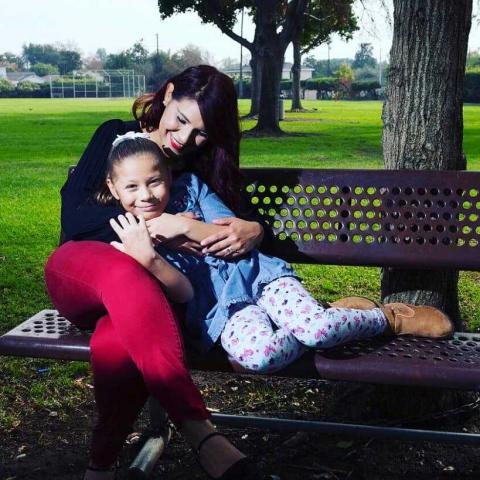
"I quickly began to appreciate that my role as a mom was not just to keep Rosita fed and clothed, but also to think about her future and ensure she is counted in the Census." - Lizette Escobedo
Census 2020: Securing Our Children’s Future Through A Full Count
Every mom remembers the day she held her little one(s) for the first time – a moment of both great joy and some anxiety about the uncertainty the future may bring. I became a mother (and father) to a beautiful baby girl – Rosita in September of 2009.
Like many moms, before I knew it, I found myself back at work by November of that year at NALEO Educational Fund. While I was still dealing with night feedings and a lack of sleep at home, at work we were gearing up for a major effort to promote a full count of the Latino community in Census 2010. Much like being a new parent – it was really hard work. We did not have all the time, staff or resources we needed as we worked to make sure no one in our community was left uncounted.
During this time, I quickly began to appreciate that my role as a mom was not just to keep Rosita fed and clothed, but also to think about her future. Like most moms do, I quickly discovered that there was a lot about Rosita’s life that was outside my control. I couldn’t predict what time she would wake up at night or if she got sick. What I could do, however, was try my best—and that included working to improve our community and to build a more representative democracy by making sure she was counted in Census 2010.
Even though Rosita was just a few months old I had the opportunity to give her a voice by making sure she was included on my home’s Census form in 2010. Getting counted in the decennial Census was a way to ensure that my daughter and the rest of our community were visible in 2010. It meant fair representation in Congress and the proper enforcement of key civil rights policies that affect underrepresented communities.
As a mother, accurate census data are also important since they help to ensure that my daughter’s school and community get the federal funding they need. Key programs like Head Start; the Special Supplemental Program for Women, Infants, and Children (WIC); the Child Care and Development Block Grant; and the Maternal and Child Health Services Block Grant—distribute $20 billion annually to states and localities based, at least in part, on the census count of the population under age five.
Latinos are the second largest population group in the country and among the fastest growing. Despite this fact, Latino children are among the most undercounted segments of our nation’s population. In Census 2010, almost one million children ages 0-5 were not counted. Of those missed in the last decennial census, approximately 400,000 were Latino children ages 0 to 4.
My colleagues and I at NALEO Educational Fund worked tirelessly to build strategic partnerships, develop informational materials, and generate earned media opportunities that would help address the undercount of our youth in 2010. Despite these efforts, a decade later Latinos and communities of color remain among the hardest to count populations in our country.
Looking ahead, the 2020 Census faces even more challenges than in 2010. A lack of adequate funding for the Census Bureau, coupled with a deep sense of mistrust and fear of our government has put the upcoming decennial count at an even greater risk of failure.
These issues are even more problematic given the last-minute addition of an unnecessary and untested citizenship question that is poised to leave tens of thousands of Latino children, Latino parents, immigrants, and communities of color uncounted in 2020. This undercount could result in not only less federal funding for education, healthcare, and transportation infrastructure programs, but it would also affect our political representation for the next ten years.
As the U.S. Supreme Court weighs whether the citizenship question will remain on the 2020 Census form, it is important to note that no other issue before our nation’s highest court will have more direct consequences for the Latino community. In a survey conducted by NALEO Educational Fund, 78 percent of Latinos stated that the inclusion of a citizenship question would make people afraid to participate in Census 2020.
The 2020 Census will be the first in the nation’s history in which Latinos make up the nation’s second largest population group. An undercount of the Latino population would ultimately mean a failed Census for our children and for the country.
This issue is deeply personal for me. That’s why when NALEO Educational Fund invited me to rejoin the team and work toward a full count of our community in the upcoming decennial Census, I accepted the challenge without hesitation. This work will affect not only my daughter, but also my community and country.
I was warned that this time around the fight for our democracy is tougher than any previous effort. The challenges are greater, there is more at risk, and the very core of our democracy is being threatened.
The fight for an accurate census is not only a fight for our constitution and for our civil rights, but it is also a fight for all mothers who are committed to ensuring that their children have the tools and resources they need to succeed.
The stakes are too high to fail. That’s why I, alongside my colleagues from coast-to-coast, will be working in the coming months to secure a full count of Latinos and all Americans to ensure that my daughter’s generation does not have to wait another 10 years for smaller classroom sizes or much needed Title I funding.
A full and complete count in Census 2020 is not a Republican or Democratic issue, it is an American one. I hope you will join me in making sure that your family is fully counted in order to secure a better future for Rosita and all children.
¡Hágase Contar! (Make yourself count!)
By Lizette Escobedo
______
The ¡Hágase Contar! Census 2020 Campaign is a national effort led and developed by NALEO Educational Fund. The ¡Hazme Contar! Campaign, is a sub-campaign focused on achieving a full count of very young Latino children (ages 0-5). Both campaigns will focus on regions with significant Hard-To-Count (HTC) Latino communities and a notable undercount of Latino children.



The views and opinions expressed in this post are those of the author(s) and do not necessarily reflect those of MomsRising.org.
MomsRising.org strongly encourages our readers to post comments in response to blog posts. We value diversity of opinions and perspectives. Our goals for this space are to be educational, thought-provoking, and respectful. So we actively moderate comments and we reserve the right to edit or remove comments that undermine these goals. Thanks!